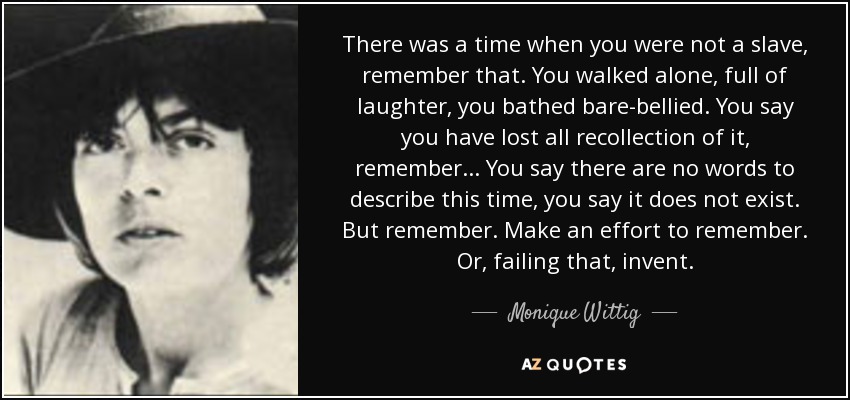
As a result, these ostensibly literary essays offer the most cogent statement of her political beliefs and, consequently, the most satisfying reading. The author is at her most elegant in the literary essays, which explicate the complex relationship between literary form and ideology. The book's first half, containing the political essays, is a bit repetitive. Wittig's prose is methodical and aggressive, combative and dense. For women, she concludes, lesbianism is the logical escape from patriarchal domination. There is but sex that is oppressed and sex that oppresses.'' Drawing on de Beauvoir, Wittig strenuously resists both biological determinism and its twin, essentialism, arguing that sex itself is a social, ergo ideological, construct and that man and woman are not eternal categories. Half of the nine essays in this brief collection deal directly with the politics of gender, a battlefield on which Wittig has staked out a nearly unique position: ``There is no sex. The exhibition is on view in conjunction with an international conference to be held on October 10 – 11, 2019 at Yale.Wittig ( The Lesbian Body ) is a key figure in French feminism, perhaps the foremost theorist of a profoundly radical lesbianism. Morgane Cadieu, Assistant Professor in Yale’s Department of French, has selected key documents that show the progress of Wittig’s life and work. Among the material are drafts of writings, important letters from Mary McCarthy, Marguerite Duras, and Wittig’s publishers and substantial files covering her teaching and later works, including the film, T he Girl, created with Sande Zeig. They cover her life and work, focusing mainly on the period from the mid-1970s forward.

Wittig’s papers came to the Beinecke Library in 2014.

She became a member of the faculty at the University of Arizona in 1990, and her collected essays, in the volume The Straight Mind (1992), made her work available to a wider audience and influenced feminist theory around the world. In May 1970, Wittig co-authored the manifesto of the French feminist movement in 1973 she published Le Corps lesbien (The Lesbian Body) and in 1975 she and her long-time partner Sande Zeig published Brouillon pour un dictionnaire des amantes (Lesbian Peoples: Material For A Dictionary). Wittig ( The Lesbian Body ) is a key figure in French feminism, perhaps the foremost.

Her first novel, L’Opoponax, published in 1964, was awarded the Prix Médicis and Les Guérillères, from 1969, became a touchstone for revolutionary expression, a source of ideas for many major feminist and lesbian thinkers and writers. Beacon Press (MA), 24.95 (110pp) ISBN 978-0-8070-7916-4. Monique Wittig (1935 – 2003) was an influential feminist writer who explored the intersections of gender roles, sexuality, language and literary form. English Hypatia Abstract References The Straight Mind and Other Essays.


 0 kommentar(er)
0 kommentar(er)
